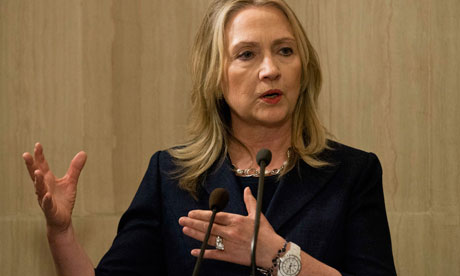
The 2012 international Aids Conference in Washington DC has so far been a feel-good event framed by encouraging developments in HIV/Aids treatment and research. The theme of the conference, an "Aids-free generation", refers to the elimination of new Aids infections among children by 2015 – a commendable objective that not so long ago would have been received as a farce. Such optimism is warranted and welcome, as there has been surplus of good news in recent years – the most encouraging is a recent push by scientists to discover and develop a "functional cure" for HIV.
While President Barack Obama skipped the conference, Hillary Clinton showed up to confirm the US's dedication to the cause, stating: "I'm here to make it absolutely clear that the US is committed and will remain committed to achieving an Aids-free generation. We will not back off and we will not back down. We will fight for the resources necessary to achieve this historic milestone."
However, beyond all of this optimism lies a few deeply disturbing trends and omissions. While the Obama administration did lift a decades-old travel ban on people with HIV in 2009, the US still denies visa entrance to two of the communities most affected by HIV/Aids: drug users and sex workers.
Their absence has angered many, and lead to the construction of protest satellites in Kiev and Kolkata, as well as rolling demonstrations throughout the week. But perhaps the strangest transgression has been the inability of attending politicians to confront the reality of HIV transmission in 2012: that injecting drug use accounts for one third of new HIV infections outside of sub-Saharan Africa, and that while new infections have been falling since the 1990s, HIV rates have increased 25% in seven countries, largely as a result of needle and syringe sharing.
The reason why such an essential element of the fight against HIV has been overlooked is painfully obvious: talking intelligently about drug use is still taboo among those who are actively engaged in the global war on drugs. And so we find ourselves in a very dangerous quagmire: even though the end of HIV/Aids may be achievable in the near future, such possibilities will be nullified without a determined effort to halt the transmission of HIV through injection drug use. Which, in turn, requires a global reassessment of the war on drugs.
One of the most credible critics of the drug war's role in the HIV epidemic has been Dr Evan Wood of the BC Centre for Excellence in HIV/Aids Vancouver, Canada (also home to North America's only supervised injection site, Insite). In an interview with the CBC on Tuesday, Wood stated:
"We don't have a cure yet, but the tools in the tool box to control this epidemic are essentially at our fingertips. We need the political will to look at some of the political strategies that are hobbling this effort – and I include in that the war on drugs – and to start employing these strategies that really can bring about an end of Aids."
The danger inherent in ignoring rising HIV rates among injection drug users is that it could reignite the virus at the very moment it enters into manageable decline. As the Global Commission on Drug Policy's most recent report demonstrates, HIV rates are closely linked with the flux of drug markets and drug enforcement. Namely, with increased enforcement comes lower prices, higher purity and amplified incarceration rates – an ideal environment for transmission to take place, unless proper harm reduction services are available.
Nowhere in the world provides a better example of a disastrous drug policy than Russia, which pursues a zero-tolerance approach to drug use and has seen infection rates quadruple since 2000. And as the drug war expands into Africa, with the Drug Enforcement Administration following the cartel lead, we find ourselves pinned in between the invisible hand of narcotic markets and reckless government routine.
By not effectively and swiftly addressing such an vital aspect of the fight against HIV/Aids, our leaders are letting the epidemic simmer and jeopardising much of the progress that has been made in the past 30 years. If there is to be a truly Aids-free generation, it will depend on depoliticising all aspects of the virus, not just those most convenient during our current election cycle.

